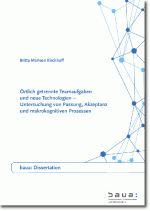Distributed Team Tasks and New Technologies - An Examination of Fit, Acceptance and Macrocognitive Processes
(in German)
In today's world of work, teams are increasingly confronted with problem-solving tasks that require knowledge-building processes as well as rule-based performance, depending on the situation. Moreover, team tasks are often characterized by changeable cognitive and physical components. Cognitive processes at team level (e. g. team knowledge building), so-called macrocognitive processes, are necessary in order to cope with such tasks. A local distribution of team members can impede rule-based and knowledge-based as well as cognitive and physical tasks. New technologies can provide a shared visual context (e. g. Software TeamViewer) and are therefore suitable for supporting distributed team tasks. A comprehensive exploration of the effects of such a technologically mediated shared visual context on macrocognitive processes in teams in tasks with variable characteristics has not been conducted so far.
Therefore, the purpose of this thesis was to further enhance knowledge about macrocognitive processes in teams and the effects of new collaborative technologies which can provide teams with a shared visual context. For this purpose, four consecutive studies were carried out. As an exemplary task, team troubleshooting was chosen because it requires rule-based and knowledge-based behaviors, as well as cognitive and physical actions. In summary, the present dissertation provides new insights into the effects of a technologically mediated shared visual context on macrocognitive processes in distributed team tasks. The results of the different studies show that rule-based and knowledge-based behavior as well as cognitive and physical actions are affected by a local separation of team members as well as by provision of a shared visual context. Thus, an integrated view to the changeable task characteristics appears to make sense, taking into account aggravating context factors. A separate consideration of, for example, rule-based and knowledge-based tasks does not represent reality in the case of troubleshooting. Creating new knowledge in unknown situations is complicated by a lack of a shared visual context, as team members are not supported in building a shared situational awareness. The process model of macrocognition in teams proved to be a suitable theoretical basis for studying the effects of a shared visual context in tasks with variable characteristics depending on the situation. The were also used to derive practice-oriented design recommendations.
Please download the complete report "Distributed Team Tasks and New Technologies - An Examination of Fit, Acceptance and Macrocognitive Processes" (in German only).
Bibliographic information
Title: Örtlich getrennte Teamaufgaben und neue Technologien - Untersuchung von Passung, Akzeptanz und makrokognitiven Prozessen.
1. edition. Dortmund: Bundesanstalt für Arbeitsschutz und Arbeitsmedizin, 2018. pages: 167, Project number: F 2288, PDF file, DOI: 10.21934/baua:bericht20180919
